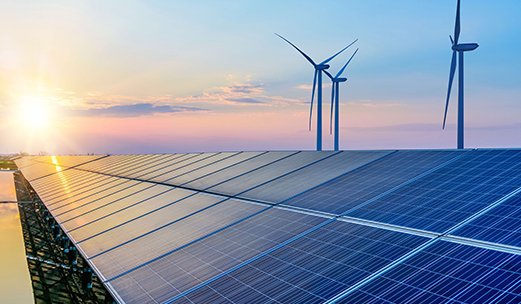Catalysing Asia's efforts for a sustainable future
Lead the charge towards a cleaner, greener and more energy-independent tomorrow.

Sustainability as a solution
Every sector has seen repercussions of COVID-19, but none has been as immediate as the global fall in energy usage. Energy demand has been severely dented because of the pandemic. Remote working arrangements, social distancing and lockdowns further curtailed energy demand, and have caused the demand for oil, coal and natural gas to be headed for their worst declines in the history of 2020. On the other hand, renewable energy is standing out as a resilient energy source, with likely flatline contribution to the global grid, thereby increasing its share in the overall energy pie in most countries.
Before this economic collapse and between 2016 and 2019, global energy CO2 emissions grew by over 1.3 GT. The Asia-Pacific region accounted for three-quarters of this global total and its energy demand is expected to double by 2030, propelled by rapid urbanisation and population growth. However, there is a growing chasm between the region’s energy infrastructure and what is required to meet future needs. If the situation persists, this energy inadequacy will continue to widen, contributing to other socio-economic challenges and deepen inequalities. The region needs innovative technologies and solutions that can generate power in a socially, economically and environmentally sustainable manner. Through investments in renewables and sustainable infrastructure, DBS is aiming to bridge the energy gap and catalyse change for a cleaner, greener and more energy-independent tomorrow.
DBS leading the sustainability charge
To fulfil its goal as a purpose-driven bank, DBS has completed 29 renewable projects across Asia amounting to around SGD3.6 billion and has done over 100 sustainable financing deals worth SGD15 billion – including sustainability-linked loans and green loans. Financing renewable energy projects sits at the core of DBS’ agenda. Within the bank, there is a dedicated team that advises and arranges financing for projects that are either greenfield or brownfield or acquired in a Merger and Acquisition (M&A). As an Asian bank, a deep understanding of the region, strong regional connectivity and market leading position in Asia’s project finance space are all advantages that DBS has harnessed to help to drive a more sustainable and equitable future in the region.
One example of a successful project is the role DBS played as the lead coordinator for the debt financing and Mandated Lead Arranger (MLA) for the Star Energy-led consortium’s winning bid for the acquisition of Chevron’s geothermal assets in Indonesia. Salak and Darajat are two of the biggest geothermal assets in Indonesia with a respective installed generation capacity of 377MW and 271MW. These assets have been in operation since the 1990s, and each of these is underpinned by a take-or-pay Energy Sales Contract with PT.PLN(Persero), which has monopoly over electricity distribution in Indonesia. DBS as International Bank Coordinator assisted in leading, guiding and helping the parties understand a series of complex issues and promptly responded with solutions. The 5-year US$1.25b debt was eventually refinanced by the US$1.11b green project bonds issued 14 Oct 2020.
Looking towards the future
In addition, as part of DBS’ efforts to partner clients from key industries to transition to a low-carbon economy, DBS published the world’s first Sustainable and Transition Finance Framework and Taxonomy. This forms the bedrock for DBS’ engagement with clients keen on furthering their sustainability agenda. It will serve as a reference to guide clients to adapt and build resilience in the face of climate change, resource scarcity and address critical global issues such as social inequality. With the launch of the taxonomy, DBS will also be the first Singapore bank to offer Transition Financing. DBS will take a prudent, scientific approach to evaluate the transitional qualities of the economic activities and whether clients have a strategy to adapt their businesses to arrive at the ambition of the Paris Agreement.



